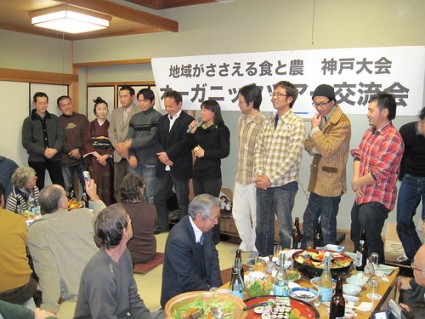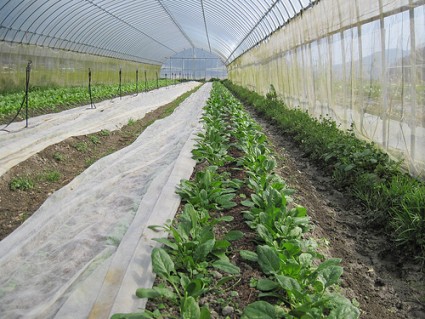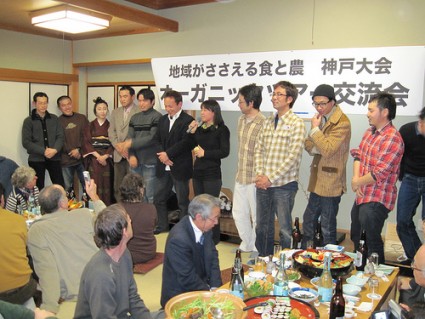“We wanted to connect ‘safe’ foods and the support of organic farming with the survival of family farmers, with the preservation of the environment, with opposition to militarism and imperialism, with demands for social justice, and with our need to work collectively to create a better future.” — A 20-year teikei (CSA) member at the Urgenci conference
KOBE, JAPAN — Attending the Urgenci conference “Community Supported Foods and Farming” in Kobe, Japan, in February reminded me that sometimes traveling to the other side of the world can b Honoring Japanese CSA farmers at the Urgenci event in Kobe, Japan.Elizabeth Hendersonring new insights to our local work.
Honoring Japanese CSA farmers at the Urgenci event in Kobe, Japan.Elizabeth Hendersonring new insights to our local work.
Urgenci is an international network based in the south of France governed by an 8-member board than includes one American, Benjamin Shute of Hearty Roots Farm in New York State. Urgenci’s bi-annual gatherings bring together farmers, activists, and researchers involved in community-supported agriculture (CSA) and other cooperative ventures linking consumers directly with producers. In Japan, the word for CSA is teikei.
For the past two years, Urgenci has been focusing on “missions,” sending two-person teams, an AMAP farmer and a consumer activist, to countries in Eastern Europe and north Africa to spread the word about consumer-producer cooperatives and to facilitate adaptations in each country.
A thousand or so people attended the 2-day conference, and 75 stayed on for the 9 am-8 pm Urgenci meeting. While Japanese outnumbered other nationalities, there were representatives from England, France, the US, Korea, Malaysia, Australia, Italy, Latvia, Roumania, Mali, and Morocco. Aside from Ben Shute and me, the only other Americans were his wife Lindsay, and Jo and Jim Sluyter from Michigan. The presence of the Eastern Europeans and Africans is testimony to the success of Urgenci’s missions and international exchanges.
Before the conference, a bus carried us into the hills behind Kobe to tour organic farms. Many of the pine trees in the forests we passed seemed to be dying. Etched out of the surrounding forests, the villages are patchworks of small bermed fields, many with the residues of rice plants standing in neat rows. Traditional Japanese farm houses with their curving tiled roofs are sturdy and very beautiful. Even in this winter season, you can see the ornamental gardens that surround them.
Our first stop was a blueberry field, perhaps three quarters of an acre. The young couple that grows these plants told us that fresh blueberries are not a familiar fruit in Japanese markets. The husband spent a year learning organic farming as an intern with Teikei farmer Shinji Hashimoto before marrying and settling in the village with his wife who agreed to farm with him on condition that they grow the blueberries. Five years later, the blueberry plants look well-nourished and carefully pruned. The wife treated us to some of her first batch of jam. A culinary success. The couple runs their own Teikei with 40 families, selling to restaurants as well. All of their fields are certified organic.
That evening, these two were among the 17 new farmers honored at a grand dinner party and celebration of local organic food. Shinji confided to me that he had invited the mayor of the town and other local dignitaries to speak at the dinner so that they would see these young farmers and taste the food they are growing. In an area that has been losing farmers steadily and where the average farmer age is 70, the Ichijima prefecture (county) has been subsidizing organic farms for a number of years, paying 50,000 yen per hectare per year of vegetables, covering half of the certification fee, and paying the entire salary of interns who commit to farming there for five years. The results were tangible at this sumptuous dinner.
Along with Eliane Joumond, a French fruit grower with a CSA, Kristen Glendinning, who organizes CSAs for the Soil Association in England, and Judith Hitchman, our translator, I spent the night at Shinji’s home. As the morning light was breaking, we visited the Shinto shrine, perfectly camouflaged in the woods next to the house. Over a traditional breakfast of rice and miso soup, Shinji’s wife told us about her work; she does all the washing, prepping and packing, while Shinji and his two interns do the growing. In the seven years since I visited before, Shinji has been able to purchase several of the small scattered fields that make up his farm. Where one chicken house stood before, there are three now. Together with 5 other farmers, Shinji supplies the vegetables and eggs for 400 households.
 in the greenhoue of a Japanese CSA farm, greens thrive. Photo: Elizabeth Henderson As Shinji tells the story, their Teikei began in 1975 and at its peak 20 years ago encompassed 30 organic farms and 1500 households. Then a serious split took place. It would be fascinating to get the whole story. These days, the five farmers negotiate their crop mix among themselves and each sets goals for what he needs to earn. They invoice the group for what each puts in the shares, and pay 2 – 3% for a book keeper provided by the agricultural cooperative to which they all belong. Deliveries are made by truck with the consumers paying the driver. The members also pay a fee and the farmers can take out interest-free loans from this sum. Now this is a tip we might want to bring home to US CSAs!
in the greenhoue of a Japanese CSA farm, greens thrive. Photo: Elizabeth Henderson As Shinji tells the story, their Teikei began in 1975 and at its peak 20 years ago encompassed 30 organic farms and 1500 households. Then a serious split took place. It would be fascinating to get the whole story. These days, the five farmers negotiate their crop mix among themselves and each sets goals for what he needs to earn. They invoice the group for what each puts in the shares, and pay 2 – 3% for a book keeper provided by the agricultural cooperative to which they all belong. Deliveries are made by truck with the consumers paying the driver. The members also pay a fee and the farmers can take out interest-free loans from this sum. Now this is a tip we might want to bring home to US CSAs!
That afternoon, the tour continued to an organic rice grower and sake maker. Unfortunately, those of us who were speakers at the conference returned to Kobe for a briefing. The organizers were justifiably nervous about the logistics of a gathering of over 1000 people with translation into English, French and Japanese. Dozens of student volunteers served as staff.
Here are some highlights from the conference. On day one, after greetings by dignitaries from the national and prefecture ministries of agriculture, Professor Shigeru Yasuda provided a history of organic agriculture in Japan. Now retired from Kobe University, Yasuda was a founding member of the Japanese Organic Agriculture Association (JOAA) in 1971 and one of the authors of the 1978 Ten Principles of Teikei, based on the first five years of Teikei experience (you can read them on p. 269 of my book Sharing the Harvest). The man who inspired and provided the philosophical grounding for JOAA was Teruo Ichiraku, an organizer of farmer cooperatives. Upset upon learning that even mother’s milk was contaminated by pesticides, Ichiraku developed a critique of increasingly corporate industrial agriculture and proposed direct relations between farmers and their customers as the antidote. This quote from “River Basin Region Self Sufficiency and Teikei will Drive Organic Agriculture,” summarize his teachings:
“Teikei in its most pure sense is cooperation of people supporting one another in the basics of life and living via farm produce for both farmers and consumers. It also establishes self-reliance for both farmers and consumers…It is correct to say that organic agriculture and Teikei are the links between people, nature and all creatures on earth that nurture thoughts for others and desire to create a society that cherishes warm-hearted living. Such human relations will go beyond the boundaries of nations, growing and reaching out to each region and each country around the world, creating world wide solidarity. This will certainly be the foundation of world peace.” (From booklet distributed at the conference by the Japanese Organic Agriculture Association (JOAA). February 2010, p. 75.) Professor Yasuda went on to state that the three pillars of organic agriculture are 1. clean up the environment 2. protect the earth and 3. promote health. He concluded his talk by asking the audience to reflect on their own behavior. If they had eaten bread for breakfast, they had enriched US fields instead of supporting local, organic rice growers.
The conference was rich in testimonials from participants in the Teikei movement. Yoshinori Kaneko, whose farm is still supplying families with shares of their harvest after 35 years, talked about the 95 younger farmers he has trained. Katsuo Watanabe was one of the 18 farmers from Miyoshi Village who responded to the group of Tokyo women from “The Grow and Eat Safe Food Society,” to form the very first cooperative Teikei in 1974. “Food is life, not a commodity,” Wakashima Reiko, a 20-year member of that group, gave voice to a theme that echoed throughout the two days. She outlined their basic principles: 1. we take everything the farmers offer, 2. the farmers set the prices, 3. consumers cooperate with producers for distribution. Kobe Professor Toshiko Masugata moved the audience to tears with her memories of the way Teikei farmers and members supported one another through the devastation of the Kobe earthquake.
The conference also covered other forms of producer/consumer solidarity. I spoke on “CSA Around the World,” an update of the chapter from Sharing the Harvest: A Citizen’s Guide to CSA (Chelsea Green, 2007, you can read the full text on the publisher’s blog or on the Urgenci website). The newest developments include a first CSA near Beijing, and the remarkable Urgenci missions to Eastern Europe and Africa. Andrea Calori, an Italian professor and organizer of “Gruppi di acquisito solidali,” (GAS, or Solidarity-Based Buying Groups) gave a lively talk on local, not as a geographical dimension, but as a way of thinking. A holistic approach to sustainable development, in Calori’s terms, must empower local people through partnerships that integrate commerce, agriculture, land use planning, fully honoring a community’s cultural heritage. Since 1994, over 600 GAS have allowed groups of 10 to 80 families to purchase directly from producers of food, clothing, and all kinds of services, and these local groups have formed regional clusters and a national network with links to Fair Trade.
On a panel on local food systems, Joy Daniel from the Institute for Integrated Rural Development (IIRD) in Aurangabad, described their work in a part of India where small-scale farmers survive on less that $1 a day. The IIRD has enabled over 10,000 mainly women farmers to move from organic farming by default to conscious use of organic methods of production for local farmers markets where they can get a better price for their food than by selling to brokers. Instead of third party certification, they have a Participatory Guarantee System (PGS); women who have gone through the IIRD training act as technical advisors and coaches to the others. Since most of them are illiterate, they use a verbal pledge to a list of 14 simple and clear standards.
Andre Leu, Australian farmer and vice president of the International Federation of Organic Agricultural Movements (IFOAM) delivered a passionate speech on the vital role of small holdings in solving the world food crisis. He sited studies by the Food and Agriculture Organization of the United Nations (FAO) that show that over a billion people, one sixth of humanity, go hungry every day. The solution is small scale organic food production and marketing to ensure the food security of local communities. Like Joy Daniel, Leu emphasized the conclusions of the International Assessment of Agricultural Knowledge, Science and Technology for Development (IAASTD) that if we are to feed all the world’s people, we must increase agricultural biodiversity, enhance the care of soils, water and ecosystems, improve rural enterprises and village opportunities, grow and consume local farm products and eat less meat. Leu announced that IFOAM is making PGS and support for small holders their top priorities.
The conference concluded with an official “Declaration,” affirming the role of Teikei and Urgenci “in protecting organic small scale farming and promoting partnerships… where the food and farms support the community and the communities support the earth. This is the meaning of true food sovereignty. It means thinking globally and acting locally.”
That night the conference organizers treated us speakers and international visitors to a gala dinner in a swanky restaurant on the 30th floor of the Portopia Hotel. A bit rich for my blood, though I do not deny I enjoyed the food and the abundant sake. The view of the port and the city was truly spectacular. The Portopia is part of a new section of Kobe, constructed on an artificial island in the harbor.
The next day was work – the marathon meeting of the Urgenci Network. Since previous meetings, both the one I attended in Portugal and the subsequent one in France, had been fraught with conflict, among the French and between the French and everyone else, Arthur Getz had been asked to act as mediator and facilitator. Arthur is an American with long ties to Japanese organic agriculture who currently directs Global Policy Change and Food Systems Advocacy for Heifer International. He conducted the meeting with humor and skill, preventing a relapse into the angry debates and cultural misunderstandings that had scarred the earlier meetings. Board president Katsu Murayama and Jocelyn Parot reported on Urgenci’s work over the past two years and presented the budget. French support has kept the organization going; finding a more sustainable solution is one of the challenges ahead. In honor of his energetic and dedicated work organizing the international missions, the group elected Daniel Vuillon honorary president. As a result of the day’s discussions, Urgenci will continue encouraging the spread of CSA-like projects, try to establish regional networks and seek membership fees from each project, all their members and existing networks like Just Food in NYC. The other top priority is closer partnerships with IFOAM and Via Campesina, the other international network of small farmers. Board elections concluded the meeting. To fill out an application to join Urgenci, go to www.urgenci.net. There you can also read the network’s newsletters and reports on the dissemination missions.



